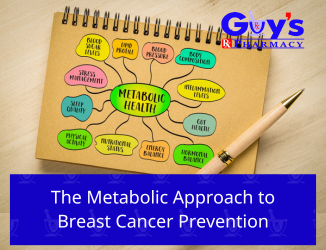In our first post, we uncovered the hidden triggers of breast cancer — from inflammation and viral infections to chemical exposure. Now, we turn our attention inward to explore how metabolic health shapes cancer risk. Understanding the connection between blood sugar, obesity, and cancer cell growth gives us new tools to take control of what we eat and how we live. It’s not just about sugar — it’s about strategy.
As we think about the modifiable risk factors for breast cancer, it helps to understand what is behind the growth and development of these cells. Cancer cells thrive on glucose, like many of the cells in the body. By understanding the sugar-cancer connection, we can make strategic changes to the foods consumed to minimize this risk. It’s more complex than just skipping soda, though.
Cancer’s Dependence on Glucose
Cancer cells require glucose for energy to continuously reproduce. Those who have a high sugar intake in their day increase insulin resistance throughout the body, meaning your body cannot use sugars properly. This increases cancer risk. The objective, then, is to reduce processed carbohydrates. These are carbs that carry no real nutritional balance to your body. However, by minimizing their presence, it’s possible to better balance blood sugar.
Obesity and Breast Cancer Risk
Uncontrolled high blood sugar is a contributing factor to obesity. A person who’s overweight is likely to see more estrogen production, which also supports cancer growth. Another way in which being overweight contributes to cancer development is due to the increased risk of inflammation. As we mentioned in a previous blog, chronic inflammation in your body is a cancer promoter, and the longer it is present, the more intense it grows.
To overcome these challenges, we need to focus on several core steps:
- Consume a balanced diet that maintains proper blood sugar levels
- Focus on portion control to minimize calorie intake that leads to fat deposits
- Build metabolic health tracking to know what we are consuming
Intermittent Fasting and Metabolic Health
Another component of supporting your body’s health is incorporating intermittent fasting into your routine. The fasting process provides an opportunity for cellular repair to occur while also reducing insulin levels more profoundly. As a result, it works as a type of cancer prevention strategy.
In our next blog, “Key Nutrients for Breast Cancer Prevention,” we’ll uncover some of the most important resources for fighting back against cancer through nutrition. Visit Guy’s Pharmacy now for metabolic support supplements.

